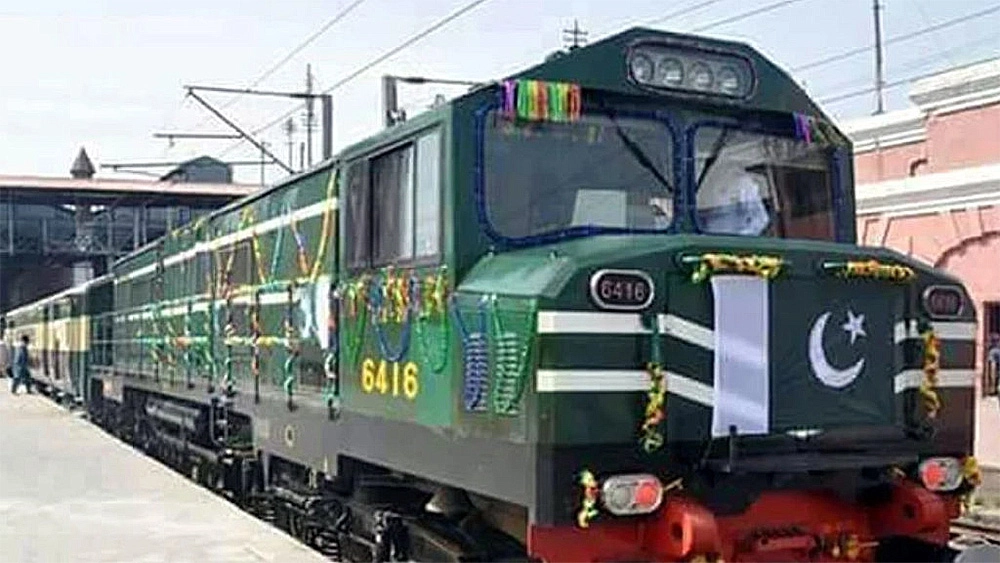Pakistan develops strategic rail map for connection to Russia
Pakistan has outlined a strategic rail map to engage with Russia and connect the two nations via railway networks and secure trade routes by circumventing the threat of US sanctions.

Pakistan’s Ministry of Foreign Affairs has endorsed this proposal, and revealed that its government was developing a three-pronged strategy including government-to-government (G2G) frameworks and projects, business-to-business (B2B) cooperation to foster trade and investment, and mechanisms to ensure safe trade and business operations. Pakistan and Russia are members of the Shanghai Cooperation Organisation, which promotes Eurasian trade and connectivity.
The State Bank of Pakistan (SBP) has cautioned that doing business with Russian entities, which are already under sanctions, could pose challenges. It, however, highlighted that other nations such as Turkiye were conducting transactions with Russia in local currencies.
During a recent meeting at the Planning Commission, officials of the Pakistani Ministry of Foreign Affairs stressed the need for adopting viable strategies that could be taken up by a high-powered delegation set to visit Russia shortly.
Pakistan’s railways secretary outlined three crucial rail routes to build linkages with Russia and Central Asian states. These include upgrading the Quetta-Taftan rail network which would connect with Iran’s railway network in West Pakistan and would thus link with the North-South Transportation Corridor. A memorandum of understanding (MoU) has already been signed in June 2024. In this regard, a bilateral meeting is expected in the current month to implement the MoU and identify areas of cooperation.
Under the second route, the Kohat-Kharlachi rail network will be connected with Central Asian Republics through Afghanistan following a complete feasibility study. That is designed for exploiting Afghanistan’s coal reserves, but can be extended into Uzbekistan and ultimately link with the Turkestan-Siberia railway, which connects to Russia at the Uzbekistan border and runs through to Novosibirsk.
For the third route, the Minelik Express will connect Reko Diq,also close to Iran, with Pakistan’s Gwadar Port, just west of Karachi, to gain access to markets of Azerbaijan and Russia. This is a direct and route to the Arabian Sea, significantly reducing the cost of transporting minerals. Reko Diq is also the site of the world’s largest gold and copper mine. Reko Diq has estimated reserves of 5.9 billion tonnes of ore grading 0.41% copper and gold reserves amounting to 41.5 million oz, and a mining life of at least 40 years.
Pakistan’s minister for national food security and research and industries and production supported a proposal of the special assistant to the prime minister on foreign affairs to come up with comprehensive plans for holding negotiations with Russia.
They also sought guidance of the State Bank of Pakistan on engaging in trade and business with Russia. The central bank clarified that those transactions that did not involve sanctioned entities would not face any issues, though banks would still be cautious due to the sanctions regime and Financial Action Task Force (FATF) compliance concerns. The Bank noted that regional banks were trading in their own currencies and coined the idea of exploring a barter trade mechanism to boost ties with Moscow. That could include trading gold and copper for railway construction. China’s state owned railway engineering companies will also be interested as part of Beijing’s Belt & Road Initiative.
The Ministry of Foreign Affairs recommended aligning the visit of a delegation to Russia with the upcoming Inter-Governmental Commission meeting in September 2024.
That has included suggestions that Russian expertise should be leveraged for laying electricity transmission lines for ongoing hydel projects at high altitude and in extreme weather conditions. Earlier this month, Russian President Vladimir Putin offered Pakistan increased energy supplies, including crude oil, during a meeting with Prime Minister Shehbaz Sharif in Astana on the sidelines of a Shanghai Cooperation Organisation (SCO) summit. Putin and Shehbaz were in Kazakhstan for the regional summit, and it was their second meeting. Both leaders had previously met in September 2022 in Samarkand on the sidelines of another SCO summit.
Pakistan is keen to develop close relationship with Russia as part of efforts to diversify its foreign policy despite pressure from the West. In June last year, Pakistan received its first shipment of Russian crude oil under an agreement signed between the two countries. A cargo carrying 45,000 tonnes of crude oil arrived in Karachi while another 50,000 tonnes reached a week later.


 Other topics:
Other topics:
 REAB Services
REAB Services

 News
News
 Useful tip
Useful tip

